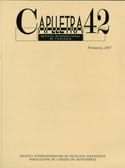La traducció catalana de la «Història de les Amors de París e Viana»
DOI:
https://doi.org/10.7203/caplletra.42.4818Keywords:
Fifteenth century Catalan, Castilian and Italian literature, History of culture, Onomastics, Paris e Viana. Abstract
Abstract
The text of the three Catalan editions of «Història de les amors de París i Viana», published in Barcelona and Girona in the last decade of the fifteenth century, shows a linguistic orientation towards Castilian and Italian onomastics. It has led to postulate two hypotheses on its textual dependence: a Castilian origin and an Italian origin. A revision of the text as translation and adaptation for the printing allows to ascertain the confluence of two linguistic layers: one, of the first half of the fifteenth century, which explains the persistence of archaic features and the Italian onomastics, and another, contemporary with the edition, which accounts for the Castilian orientation of the text
as a modernising option within the sociolinguistic context of the reign of Ferdinand the Catholic (1479- 1516).
 Downloads
Downloads
Downloads
Published
How to Cite
-
Abstract598
-
PDF (Català)134
Issue
Section
License
Authors submitting work to Caplletra for publication must be the legitimate holder of the usage rights. Legitimacy for the purposes of publishing the work must also include images, tables, diagrams and any other materials that may complement the text, whether they are the author of such material or not.
Copyright: on publishing their work in the journal, the author grants Caplletra. Revista Internacional de Filologia usage rights (reproduction, distribution and public communication) for both the paper printed version and for the electronic version.
All work published in Caplletra is covered by the Creative Commons license type Attribution-NonCommercial-NoDerivatives 4.0 (CC BY-NC-ND 4.0).
RESPONSABILITY
Caplletra. Revista Internacional de Filologia does not necessarily identify with the points of view expressed in the papers it publishes.
Caplletra. Revista Internacional de Filologia accepts no responsibility whatsoever for any eventual infringement of intellectual property rights on the part of authors.






